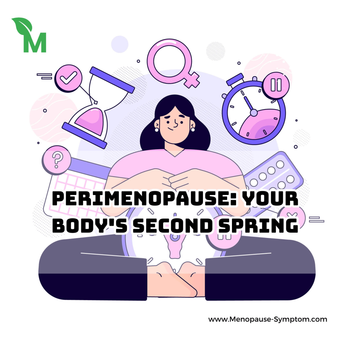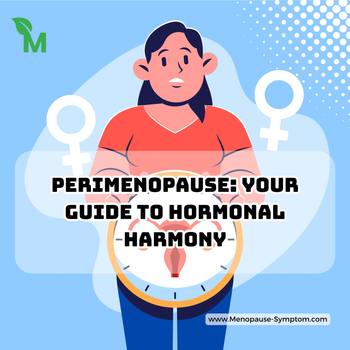Perimenopause: Understanding Your Moods And Emotions
On
06/10/2024Reading time:
5 min
Summary:
Perimenopause is an important stage in a woman's life, usually occurring between the ages of 40 and 55. This stage involves not only physiological changes in the body but also changes in mood and emotions.
Understanding perimenopause will help you better prepare for these changes and find ways to balance your emotions.
Perimenopause is the time when the body begins the natural transition to menopause, marking the end of a woman's reproductive years. Perimenopause, also known as the menopausal transition, is when the body will no longer ovulate, menstruation will stop, and fertility will no longer occur. This period can last 2-5 years depending on the person.
In fact, perimenopause is often accompanied by a variety of symptoms, from hot flashes, insomnia, to mood swings. Hormonal changes, especially the decline in estrogen, can have a profound impact on your mental and emotional health. This can lead to feelings of anxiety, irritability, or even depression. Being aware of these changes is the first step to better preparing yourself for perimenopause.
Another important element of this process is self-awareness. Perimenopause can be a time for you to reassess your values and goals in life. Many women find that they have more time for themselves, which allows them to explore new passions and engage in activities that enrich their daily lives.
Taking care of your mental health during perimenopause is extremely important. You may consider attending therapy sessions, yoga, or meditation to help balance your emotions and energy. These activities not only help you reduce stress but also improve your ability to cope with the difficult emotions you may experience during this period.
Women in perimenopause also need to pay attention to their diet and lifestyle. A balanced diet rich in green vegetables, fruits, nuts and foods rich in omega-3 can support mental health and reduce unwanted symptoms.
In addition, maintaining regular physical activity is very important. Exercising, or any sport, is not only good for physical health but also helps improve mood, reduce anxiety and make you feel more confident.
Perimenopause can also motivate you to build and maintain social relationships. Connecting with people who share similar experiences helps you feel less alone and creates a positive support network. Join a support group or community for women going through this phase to share experiences and learn from each other. This sharing can provide empathy, comfort and solace that is much needed during this time of change.
Seeking help from a medical professional is also an important option. Doctors and health professionals can provide you with the right solutions to support you during perimenopause. They can help you adjust your diet, lifestyle, and even hormone therapy if necessary. This way, you can feel more confident and in control of the symptoms you are experiencing.
Also, remember that every woman experiences perimenopause differently. You may feel more anxious and stressed, while others may experience fewer negative symptoms, or vice versa. Don’t compare yourself to others, observe your body’s signs and issues, accept and respect your own experience. This will help you prepare and deal with them better. These differences make each story unique, and all have value.
Finally, finding joy and positivity in life is the most important thing during perimenopause. Look for things that make you happy, whether they are small hobbies or big activities. This will stimulate the “happy hormones” in your body. It could be learning a musical instrument, taking an art class, or even taking a memorable trip. These little moments will help you feel more positive and create beautiful memories during perimenopause.
Remember, perimenopause is not a negative thing. Instead, see it as a precious opportunity to grow as a person, find joy, and live a more fulfilling life. You can absolutely use this period to redefine yourself and find new goals that you desire. It can be a time to pursue long-forgotten dreams, or simply slow down and enjoy the good things around you.
Perimenopause can be a difficult journey, but it can also be a wonderful time for you to explore, experience, and grow. Self-acceptance, seeking support from friends and family, and taking care of your mental and physical health will be key to getting through this period of change. Face perimenopause with a positive spirit and hope in your heart, and you will see good things waiting for you ahead.
Key Points:
· Hormonal changes: Declining estrogen levels contribute to mood swings, anxiety, and depression.
· Self-awareness: Understanding your emotions is crucial for managing perimenopausal symptoms.
· Lifestyle factors: Diet, exercise, and stress management play a significant role in emotional well-being.
· Support network: Connecting with others going through perimenopause can provide comfort and support.
· Professional help: Consulting a healthcare provider can offer guidance and treatment options.
· Positive outlook: Maintaining a positive mindset and finding joy in life can help navigate this phase.
Source: Team MPS compiled, analyzed and wrote. Please dont reup without source. Many thanks.

Perimenopause: You Are Not Alone
Invalid Date
Perimenopause is not an easy topic to discuss for women, but it is a stage that most women go through, and it is important to understand that you are not alone in this journey.

Perimenopause: Your Body's Second Spring
09.02.2024
Human life is like the seasons of the year, each stage brings its own experiences and challenges. One of the important stages that most women will experience is perimenopause.

Perimenopause: Your Guide To Hormonal Harmony
Invalid Date
Perimenopause is a natural stage in every woman's life, usually occurring between the ages of 30 to 50. This is the time when the body begins to change, with a decrease in the production of the hormones estrogen and progesterone.
